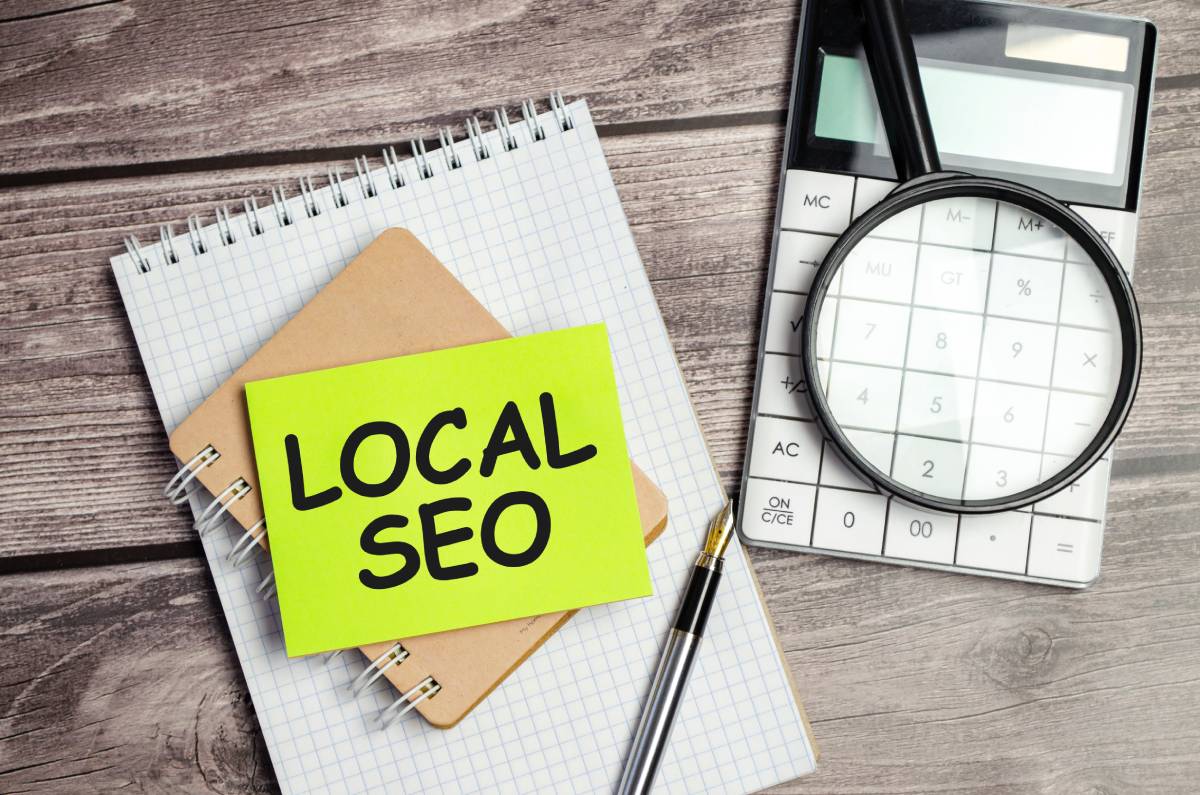
Local SEO Isn’t Rocket Science, So Why Are You Still on Page 3?
Nobody brags about being on page three of Google. In fact, most people don’t even scroll that far. If your business lives there, you might as well be invisible. Customers aren’t flipping through endless search results like it’s the Yellow Pages - they’re choosing whoever pops up first, usually on Maps.
Here’s the kicker: your competitor with the outdated logo and slow website is outranking you. Why? Because Local SEO isn’t about fancy design or clever taglines. It’s about signals - the small, boring, consistent things that tell Google, “We’re open, we’re active, and people trust us.”
Local SEO isn’t rocket science. It’s a checklist. And if you’re still sitting on page three, it’s because you’ve ignored the basics while someone else quietly nailed them. Let’s fix that.
Table of Contents
b) Optimizing Your Google Business Profile
c) The Power of Customer Reviews
d) Near Me Searches: The New Word of Mouth
e) Citations, Directories, and Backlinks
f) Mobile Matters More Than You Think
h) Schema Markup and Technical Details (Without the Jargon)
i) Social Signals and Local Branding
j) Tracking What Actually Works
Key Takeaways
Local SEO isn’t complicated, but it is unforgiving - ignore the basics, and you disappear.
-
Your Google Business Profile is more powerful than your website for local searches.
-
Recency and frequency of reviews matter more than just having five stars.
-
If you’re not showing up in “near me” searches, you’re leaving easy money on the table.
-
Mobile search dominates local intent - if your site isn’t fast and functional, people bounce.
-
Schema, citations, and backlinks may sound boring, but they quietly decide who wins rankings.
-
Consistency beats complexity. A 20-minute weekly routine will outrank overthinking every time.
a) Demystifying the Algorithm
Let’s strip away the mystery: Google is basically a picky matchmaker. Its job is to connect searchers with businesses that look trustworthy, relevant, and nearby.
Here’s what Google’s paying attention to:
-
Relevance: Does your profile match what people are searching for? (If you’re a dentist but only list “health services,” you’re invisible for “dentist near me.”)
-
Proximity: Are you physically close to the searcher? Or have you made it clear where you serve?
-
Prominence: Do people talk about you online? Reviews, mentions, backlinks - all of it adds up.
Most businesses on page three obsess over keywords. But here’s the truth: you can stuff “best plumber in Toronto” all over your website, and it won’t matter if your profile looks neglected. Google isn’t dumb. It’s not reading words in isolation; it’s reading signals of trust.
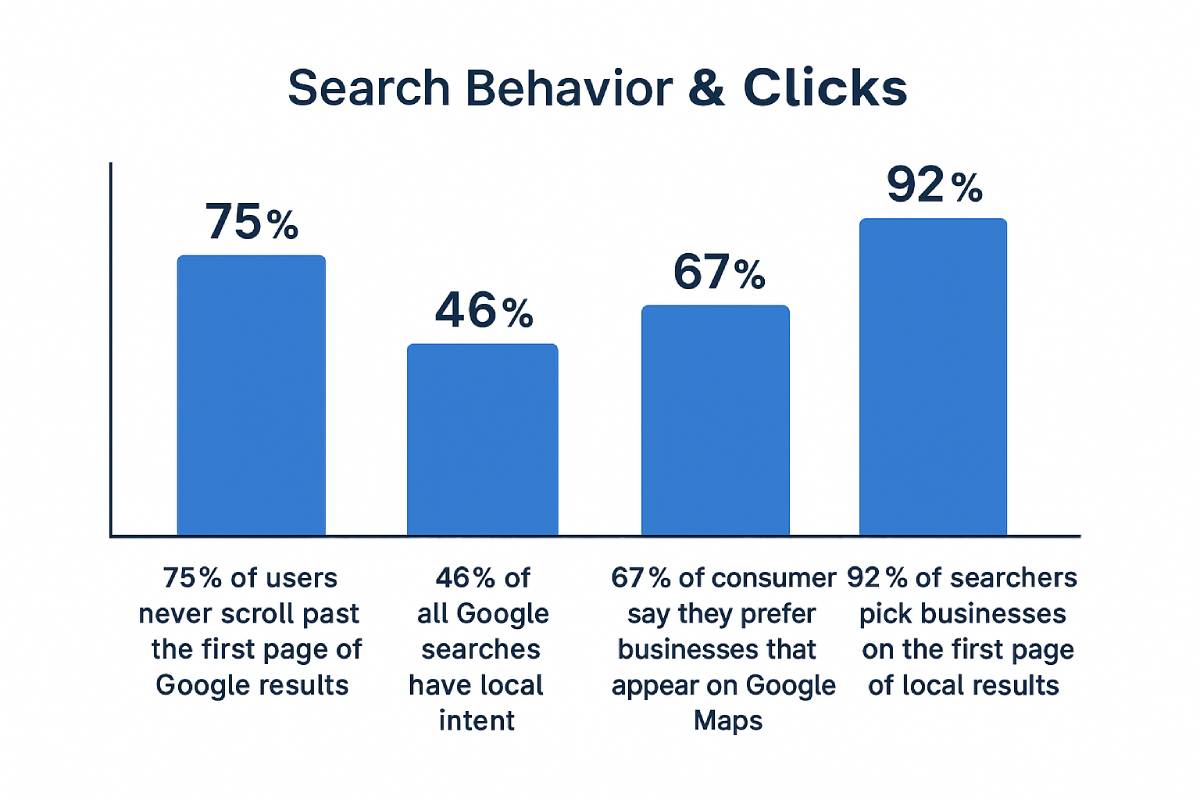
b) Optimizing Your Google Business Profile
Your Google Business Profile (GBP) is the front door of your online presence. If it’s out of date, you’re basically hanging a “Closed” sign without realizing it.
-
Categories matter. If you’re a pizza shop and only select “restaurant,” you’re leaving “pizza delivery” and “Italian food” searches to competitors.
-
Photos tell the truth. People want to see what your business actually looks like. Real, recent photos beat staged stock images every time.
-
Posts are free advertising. Did you know you can post updates, offers, and events directly on GBP? Google loves fresh content. It’s like Instagram for search results.
-
Attributes are underrated. Wheelchair accessible? Outdoor seating? Payment options? These details show up in filters, and businesses without them miss out.
Your GBP is like your résumé. If you update it once and never touch it again, don’t be surprised if Google thinks you’re not showing up for work.
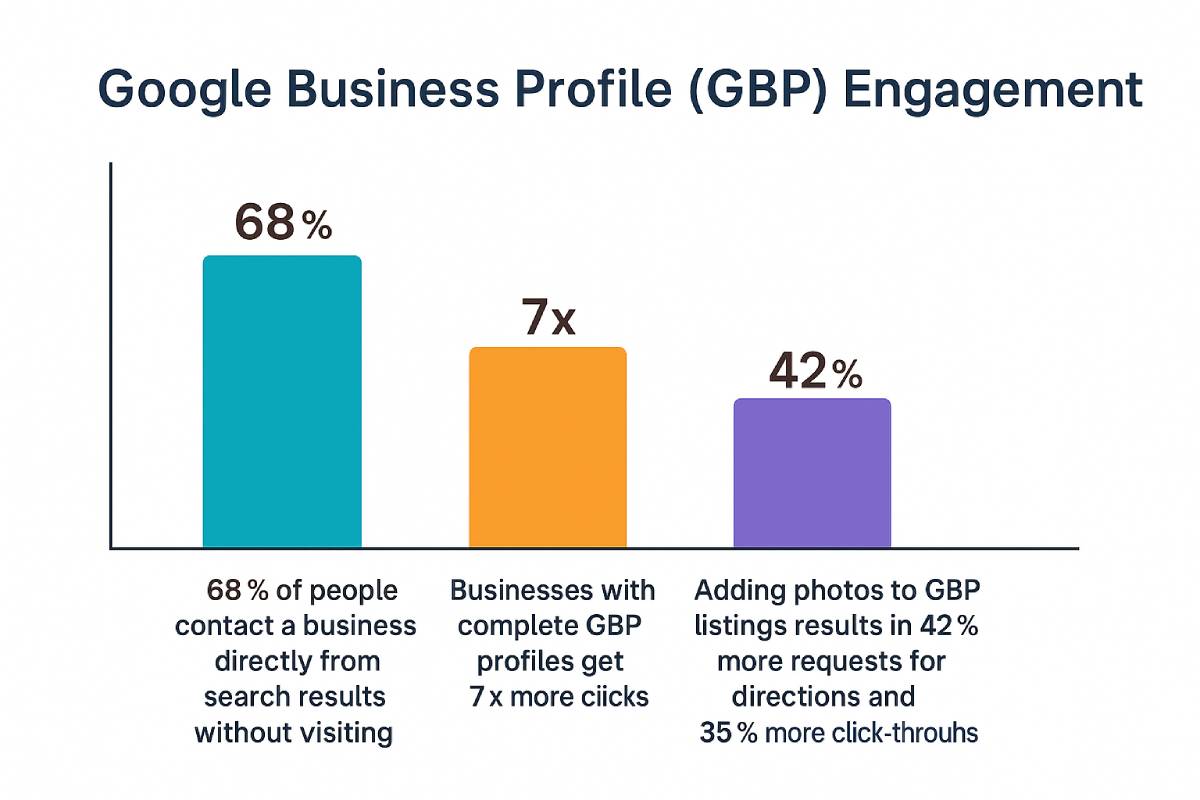
c) The Power of Customer Reviews
We all know reviews matter. But here’s what most business owners don’t realize: Google looks beyond the stars.
-
Recency beats volume. A competitor with 50 reviews from last year can lose to a business with 20 fresh ones this month.
-
Details matter. If someone writes, “Best HVAC service in North York, fixed my furnace same day,” that single review feeds Google more keywords than a blog post.
-
Response counts. If you’re not replying to reviews, you’re telling Google (and customers) you don’t care.
And let’s address the fear: asking for reviews doesn’t make you pushy. Customers are used to it. The trick? Ask right after a positive interaction:
-
“Hey, glad you’re happy with the service! Would you mind leaving us a quick review? Here’s the link.”
Make it easy, natural, and consistent.
d) Near Me Searches: The New Word of Mouth
“Near me” searches aren’t casual. Nobody Googles “plumber near me” for fun. They need help now.
But why do you still miss out?
-
Your service areas aren’t clearly listed.
-
Your GBP address is outdated or inconsistent with your website.
-
You haven’t built local content that ties you to the area.
Think of “near me” like digital word of mouth. In the old days, people asked their neighbours. Today, they ask Google. If you’re not optimized for it, your competitor is happily taking those calls.
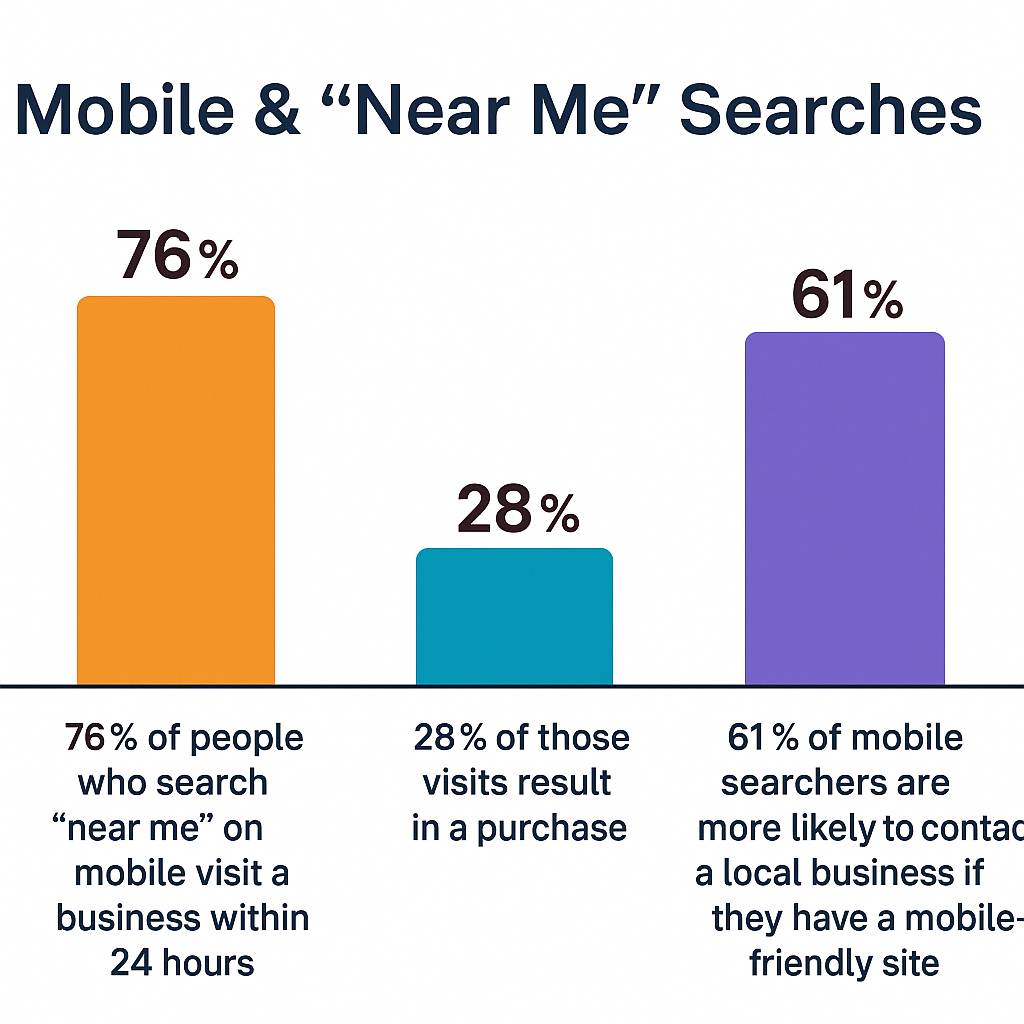
e) Citations, Directories, and Backlinks
This is the unglamorous part of SEO - but it works.
-
Citations: Your business info (NAP: name, address, phone) must be consistent everywhere. If you say “123 Main St” on one site and “123 Main Street” on another, Google gets twitchy.
-
Directories: Yes, Yelp still matters. So do Yellow Pages, niche directories, and industry listings. They’re boring but powerful.
-
Backlinks: When local blogs, news outlets, or partners link to you, it’s a trust signal. Google basically thinks, “Okay, this business is real. People talk about them.”
The businesses that skip this step often wonder why they’re stuck behind less impressive competitors. It’s because competitors quietly did the boring work.
Want to skip the guesswork and get your Toronto business seen? Check out our Local SEO services in Toronto & GTA designed to help you climb off page three and into the spotlight.
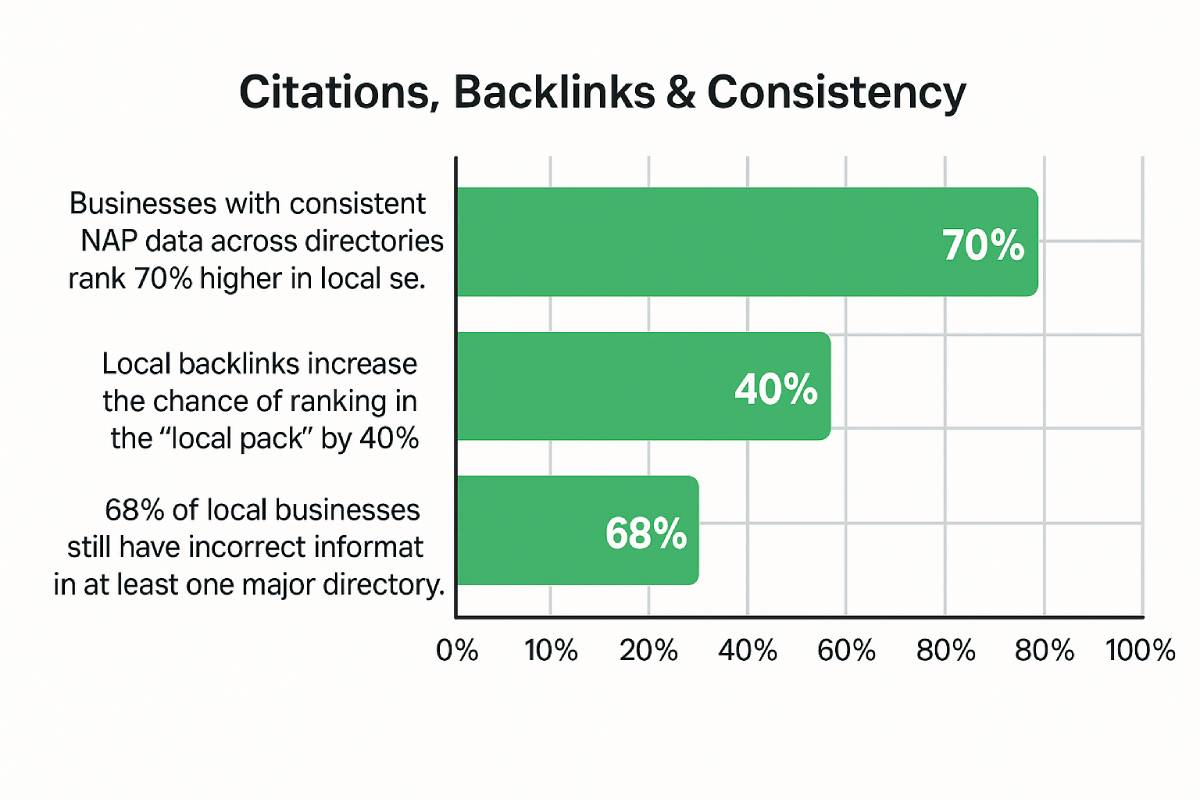
f) Mobile Matters More Than You Think
Here’s a stat worth tattooing on your brain: over 60% of local searches happen on mobile.
Translation? If your site doesn’t load quickly on a phone, you’re toast. People will bounce and pick the next listing.
Check yourself:
-
Load time: If your site takes more than three seconds, fix it.
-
Click-to-call button: One tap should connect to your phone. If customers have to copy-paste your number, you’ve already lost them.
-
Maps integration: “Get directions” should be a one-click move, not a scavenger hunt.
Mobile isn’t optional anymore. It’s the battlefield where local businesses win or lose.
g) Content That Speaks Local
Generic content doesn’t cut it. “5 Tips for Better Plumbing” could be written by anyone, anywhere. Google doesn’t care.
What it cares about is local signals. That means:
-
Writing about projects in your area (“How We Helped a Scarborough Family with Basement Flooding”).
-
Creating guides tied to your city (“Best Patio Designs for Richmond Hill Backyards”).
-
Partnering with local events, schools, or businesses and posting about it.
This proves you’re rooted in your community, not just floating online. Local content = local relevance.
h) Schema Markup and Technical Details (Without the Jargon)
Schema markup sounds scary, but it’s just structured data - little labels that tell Google exactly what’s on your site.
Think of it like a cheat sheet for search engines:
-
Local Business Schema: Tells Google your name, address, phone, and services.
-
FAQ Schema: Let your FAQs show up directly in search results (great for voice).
-
Event Schema: If you host workshops or promotions, they can show up on Google Events.
You don’t need to know code - plenty of tools add schema for you. But ignoring it is like handing Google a book without a table of contents.
i) Social Signals and Local Branding
Does Google officially use social likes and shares in rankings? No. But let’s not kid ourselves - social buzz matters.
If your business is tagged on Instagram, mentioned in Facebook groups, or shouted out by a local influencer, those mentions often create backlinks, citations, and search interest. All of which feed Local SEO.
Your branding - photos, tone, engagement - also shapes whether people click your listing in the first place. And higher click-through rates? Yes, those do matter to Google.
j) Tracking What Actually Works
You can’t improve what you don’t measure. And too many businesses give up on Local SEO because they don’t see progress - when in reality, they’re not tracking the right things.
Forget vanity metrics like “ranking for 50 keywords.” Focus on:
-
Calls from your listing.
-
Direction requests on Maps.
-
Profile views and clicks.
-
Conversions (appointments, bookings, sales).
Google Business Profile gives you a ton of this data for free. If you’re not checking it, you’re basically driving blind.
Want clarity instead of confusion? Explore our Local SEO tracking solutions in Toronto & GTA and finally see which moves actually grow your business.
k) The 20-Minute Local SEO Routine
Here’s the part nobody wants to hear: consistency wins. Not hacks, not overnight tricks.
Your weekly routine:
-
Post one update or photo on GBP.
-
Respond to new reviews (yes, even the bad ones).
-
Share one piece of local content or a social post.
-
Check insights: calls, views, directions.
That’s it. Twenty minutes a week beats hours of overthinking. Are the competitors ranking above you? They’re not smarter. They’re just showing up consistently.
- The Complete Guide to Creating and Publishing Reels and TikToks for Local Businesses
- How SearchGPT is Rewriting Local SEO for Voice: Your Business Playbook
- Affordable marketing strategies for local businesses
- Why Choose a Local Toronto Digital Marketing Agency
Frequently Asked Questions
1. Why isn’t my business showing up on Google Maps?
Because your Google Business Profile is incomplete, inconsistent, or hasn’t been updated in months. Fixing your categories, address, and activity usually helps.
2. How do I get more local reviews without being pushy?
Ask right after a good experience, keep it short, and send a direct link. Most happy customers will leave a review if you make it easy.
3. Does posting on my Google Business Profile improve ranking?
Yes. Regular posts show Google your business is alive, and they give you more chances to show up for specific keywords.
4. What’s the fastest way to move from page three to page one?
Clean up your GBP, get fresh reviews, and fix your NAP inconsistencies across the web. It won’t happen overnight, but you’ll see traction quickly.
5. How is Local SEO different from traditional SEO?
Local SEO is focused on geography and intent (“near me” searches, maps, directories). Traditional SEO is broader and more global.
6. Do backlinks matter more than reviews for Local SEO?
They both matter. Reviews build trust; backlinks build authority. The sweet spot is having both.
7. How long before I see results from Local SEO efforts?
Typically, 2–3 months for basics, 6–9 months for competitive industries. Consistency speeds things up.
Conclusion
Local SEO isn’t rocket science. It’s not about secret tricks or buying the fanciest tools. It’s about proving to Google - and to your community - that you’re active, relevant, and trustworthy.
If you’re still stuck on page three, it’s not because Google hates you. It’s because your competitor has been quietly doing the basics better. The good news? You can change that starting today, twenty minutes at a time.
About Unlimited Exposure - Your Local SEO & Digital Marketing Partner
Tired of agencies that talk in circles and deliver nothing? At Unlimited Exposure, we keep it simple: make your business visible, trusted, and the obvious choice when people in the GTA search “near me.”
For nearly 30 years, we’ve been helping businesses across Toronto, North York, Scarborough, Mississauga, Markham, Richmond Hill, Thornhill, Whitby, Ajax, and Oshawa cut through the noise and actually get results. No jargon, no corporate fluff - just strategies that work.
Here’s what we do better than anyone else:
-
Local SEO & Voice Search Optimization – get found when it matters most.
-
Video Marketing That Converts – because boring content doesn’t sell.
-
Inbound Marketing That Builds Trust – attract, nurture, and convert without being pushy.
-
Social Media That Actually Delivers – not likes, but leads and visibility.
-
AI Chatbot Integration That Feels Human – smarter automation for real conversations.
If you’ve been searching for a digital marketing agency in Toronto or the GTA, stop scrolling - you’ve already found the team that’s ahead of the game.
